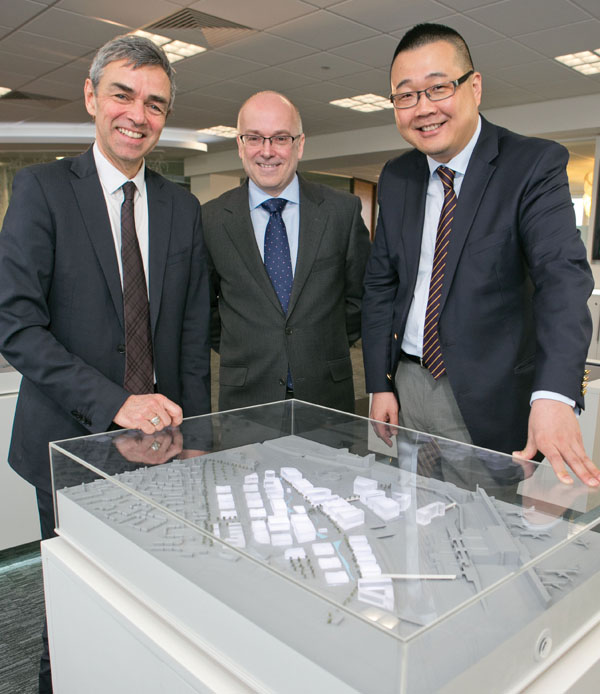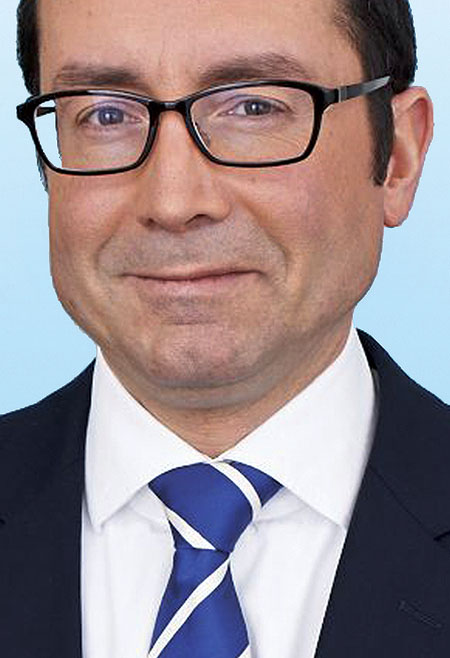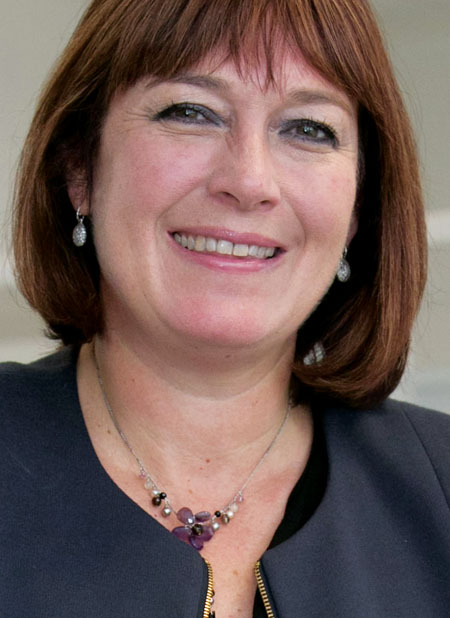.jpg) |
|
| Reuter: We see a lot of potential for increased investments from Asia |
An increasing number of Asian investors are seeking a piece of the action in Europe’s resurgent office and hotel sectors. And as fierce competition for assets pushes up prices in major cities such as London and Paris, many of them are moving into secondary cities in search of value.
Leading the pack are the seemingly omnipresent Chinese buyers with recent investments in the UK, Spain, France and Germany. The Asian invasion is also joined by eager investors from Malaysia, Taiwan, South Korea and Indonesia.
In June, China Life led the £795 million (US$1.34 billion) acquisition of the headquarters building of Clifford Chance in London’s Canary Wharf. China Life will hold 70% and Qatar Holdings 20%, while existing owners Canary Wharf Group will retain 10%. The 32-floor building is located on Upper Bank Street.
Also in June, Malaysian pension fund KWAP purchased an 80% stake in the intu shopping centre in Uxbridge, West London, for £175 million. Intu is listed in both London and Johannesburg, and owns an extensive portfolio of shopping centres. It will continue to hold the remaining 20%.
The same month, Dalian Wanda Group bought a landmark building in Madrid, the Edificio Espana, for e265 million (US$354.81 million). The seller was Grupo Santander, which bought the 25-storey office, hotel and commercial building for e389 million back in 2005, prior to the property crash in Spain.
Previously in 2013, Dalian Wanda had signed a deal to build a five-star hotel near Vauxhall in South London, as the UK flagship for its Wanda Hotels brand. This is part of the Nine Elms regeneration scheme.
In April 2014 in Germany, Chinese investors were backers for the acquisition of 10 hotels by Louvre Hotels Group, which was founded in 1976 and since 2005 has been owned by Starwood Capital Group. Its main brand is Golden Tulip.
The acquisition was led by A Capital, a private equity firm with offices in Brussels and Beijing. Its cornerstone investors are Chinese sovereign wealth fund CIC and Belgian Holdings SFPI. It is focused mainly on European mid-caps with strong Asian growth potential and selects strategic Chinese co-investors to generate a credible Asian growth strategy.
CMS Hasche Sigle acted as advisor to Louvre Hotels Group on what is their market entry into Germany. In July this year, a portfolio of 10 hotels in cities such as Frankfurt, Cologne and Dortmund were bought from affiliates of French hotel chain Balladins. Under a joint venture agreement with A Capital, Louvre Hotels has taken a minority ownership stake and also manages the hotels. The intention is to grow the German portfolio by acquiring additional properties or building new hotels.
“US investment flows, such as private equity buying office buildings, shopping centres and logistics facilities are always there, and are stable at the moment. From Asia, we are seeing an increase in activity, though coming from relatively low levels,” comments Jochen Reuter, senior associate in the Berlin office of law firm CMS Hasche Sigle. “We see a lot of potential for increased investments from Asia.”
“For many Chinese investors, their approach is to find a partner in Europe and take their time to build up a relationship. For example, the French Louvre Hotels Group and the Chinese investors via private equity fund A Capital had worked together for a number of years before the recent acquisition of 10 hotels in Germany,” he says.
There are two main approaches to investing in Europe. The first is to bid for highly visible assets in public announced deals arranged by major international real estate brokers. There is currently a good visible pipeline of deals, particularly since some owners who had pencilled in 2015 for their exit strategy have seen the strength of investment demand, and are moving sale transactions forward into 2014. However, there is such strong demand from the US, Canada, GCC and Asia that yields have been driven down, and there are few bargains to be had.
Another approach is to find a local partner or advisor and look outside the big cities for better value.
“Taiwanese or Korean investors often partner with asset management companies that have people on the ground here in Germany, and once they establish the partnership, and get the first deal done, it is easier to move on to the next transaction,” one broker explains.
For instance, the German market is dominated by the top five cities namely Berlin, Hamburg, Munich, Frankfurt and Dusseldorf. But investors are increasingly looking at high quality assets in secondary cities.
“We are seeing interest from Malaysia, Indonesia and Korea, with these investors typically looking to acquire assets in the e50 million to e100 million range,” says Stephan Fritsch, managing director at Captiva Capital Management in Hamburg, which provides a full range of investment and asset management services for investors, from sourcing deals off market, managing the asset and at some point, liquidation.
“Whereas some US funds tend to be opportunistic, and may want to flip assets after three years, Asian investors generally take a longer term view, and want assets with strong cashflows that they can hold for seven years or more,” observes Fritsch.
 |
|
| BCEG’s Yan (right) joined by MAG CEO Charlie Cornish (centre) and Argent managing director David Partridge (left) |
In April, Jones Lang LaSalle ( JLL) closed the sale of the five-star, 237-room, London Marriott Hotel Grosvenor Square in Mayfair, on behalf of New York Stock Exchange-listed Strategic Hotels & Resorts. The buyer in a public sale process was Hong Kong-based private equity firm Joint Treasure. Over a dozen offers were received, with Asian and Middle Eastern investors putting in the highest bids. The sale price was £125 million.
JLL expects the market to remain hectic over the next 24 months. Many sizeable properties in the region had been snapped up during the boom years between 2005- 2007, and their buyers now want to take advantage of the strong demand to cash out.
“There are a number of different sources of capital looking to be deployed into the European lodging sector, including for example, Canadian pension funds, US endowments and pension funds, Asian private equity and pension funds, and Middle Eastern sovereign wealth funds,” comments George Nicholas, executive vice-president in the hotels and hospitality group at JLL in London.
“Confidence in the performance of the hotel sector is returning, making buyers more willing to forward price assets, and work on the basis of forecasts for the coming year as opposed to a trailing 12- month basis,” says Nicholas. “Pricing is being helped by the fact that bank debt liquidity has come back strongly over the past 12 months, with not only European bank lenders returning but also new entrants from Japan and Southeast Asia.”
Asian hotel operators are also increasing their presence in Europe. In late May, HNA Group acquired a package of shares in Spanish group NH Hoteles that was being sold by Italian bank Intesa Sanpaolo.
In May 2013, HNA Group became a strategic shareholder in NH Hoteles by subscribing to a 20% capital increase amounting to e431.6 million. This deal not only strengthened the NH balance sheet, but also provided the company with an entry to the China market, as well as cooperation on loyaty programmes and booking systems between HNA Group and NH. The acquisition of the Intesa Sanpaolo share package has raised HNA’s shareholding in NH Hoteles to 27%.
In August, Hongkong and Shanghai Hotels held the grand opening of its new flagship hotel in Paris. Total investment has been close to e900 million on the Peninsula Paris located on the Avenue Kleber near the Arc de Triomphe. The hotel property is 80% owned by joint venture partner Katara Hospitality (formerly Qatar National Hotels before a rebranding in 2012). Hongkong and Shanghai Hotels owns the other 20%.
Sovereign wealth funds
European office buildings, hotels and residential developments have become favoured assets for pension funds and insurance companies looking to generate some extra yield on their portfolios. But competition for assets is severe, with private equity and sovereign wealth funds (SWFs) joining the buying spree.
In particular, SWFs are willing to accept lower yields and bidding up prices to levels where insurance companies or private equity often drop out of the bidding.
In May, UK private equity firm Terra Firma exited its 67% stake in Germany’s biggest private landlord, Deutsche Annington, which owns 215,000 apartments.
Terra Firma made its exit by selling direct stakes in the German company to partners who had previously been invested via the Terra Firma Deutsche Annington Fund. These include Abu Dhabi Investment Authority (with 13.4%), JP Morgan Private Equity and Bank of America Merrill Lynch. They will now all have the flexibility to sell down their stakes according to their own timetables on the Frankfurt Stock Exchange, where Deutsche Annington was floated in July 2013.
Another big buyer of property assets is Norges Bank Investment Management (NBIM), which administers the Norwegian Government Pension Fund Global (GPFG). This is the Norwegian SWF responsible for investing the country’s huge surplus oil and gas earnings. At the end of 2013, GPFG had around 5.206 trillion krone in assets (US$870 billion).
GPFG has said that it intends to increase its allocations to the real estate asset class. Cities such as London, Paris, Munich and Berlin will be primary targets while investments in Asia will also increase.
Other big European players include AXA Real Estate of France and Allianz Real Estate of Germany while various Canadian pension funds are also very active in Europe. Two Canadian pension funds recently acquired an office building on Barbarossaplatz in Cologne which has KPMG as its main tenant. The seller was Allianz Real Estate and was advised by CBRE. The two Canadian pension funds mandated real estate services company Avison Young to advise on the acquisition and also act as asset manager.
German cities such as Cologne are benefitting from increased demand from international investors who need to look beyond trophy properties in cities such as London, Paris and Munich to source assets at attractive yields.
 |
|
| Trombello: Frankfurt, Munich and Berlin are preferred German cities |
According to the European Investment Bulletin from realtor Savills, 141 billion euro worth of commercial real estate transactions were closed in Europe in 2013, a 21% rise over 2012. This was the busiest year since 2007.
In Germany, there was 17 billion euro worth of investment into commercial property during the first half of 2014. This was a 27% increase on the same period in 2013. Savills expects the second half to be just as busy, with a total of at least e35 billion for the whole year.
The commercial real estate segment in Germany is currently dominated by foreign buyers, as is the trend right across Europe. “Overseas investors are driving activity in many European markets, and non-European buyers have increased their share of the region’s investment volume to almost 30%, up from 25% in 2012,” comments Marcus Lemli, head of European investment at Savills.
He notes that the largest investor group, US private equity funds, tend to prefer large portfolio acquisitions. The other main group comprises SWFs from the Middle East and Asia-Pacific that usually go for investments of at least e200 million.
But many more smaller deals in the e50 million to e150 million range are getting done, and a European real estate advisor notes that some Asian investors can move very quickly compared to investors from other parts of the world. He recalls an investor getting in touch in 2013 hoping to acquire a building within a couple of months. “It is hard for us to initially know if that sort of investor is serious,” he says, but notes that they did indeed close a sizeable transaction very rapidly.
Germany
In the German office property sector during 2013, e14 billion worth of assets were sold, making it the busiest year for commercal property transactions since 2007. But the weight of foreign money looking for assets has helped pushed down yields, which are currently around 4.4% in Munich and Hamburg and around 4.7% in Berlin and Frankfurt.
Late last year in Frankfurt, Chinese private equity fund AE Funding Luxembourg came in with two deals involving office towers. In one of the transactions, Colliers International Frankfurt led an off-market deal involving a tower that is being renovated by developer Phoenix Real Estate.
“There is a clear preference for Frankfurt, Munich and Berlin among foreign investors, and there is a type of Asian and Middle Eastern investor who is only interested in CBD (central business district) skyscrapers,” says Ignaz Trombello, head of investment at Colliers International Germany in Dusseldorf. “Of course, they are sensitive to the fact that yields have fallen below 5% in these cities, but starting yields are not the top priority for these investors.”
“However, there is another type of Asian investor who will look at sale and leasebacks in non-CBD locations or secondary cities, as long as the property has good covenants and long term 12-15 year leases with high quality companies,” he adds.
“Asian investors, including insurance companies from South Korea, China and Taiwan, are taking part in tender processes in Paris and the top seven German cities, and are also increasingly interested in cities such as Madrid and Rome,” says Trombello. “For example, we have recently seen the acquisition of a shopping centre in Rome by GIC of Singapore, and the acquisition for refurbishment of the historic skyscraper Edificio Espana in Madrid by Dalian Wanda.”
Local partners
Partnerships with experienced European real estate players can be joint ventures or funds, but are also being done via the increasingly popular structure of separate accounts.
Many investors are setting up separate accounts with local real estate investment managers to get on the ground expertise and look for assets in a highly competitive environment. Separate accounts give the investor a high level of customization and control over how their capital is deployed.
Invesco Real Estate recently made the first acquisition on behalf of a new separate account client, an Asian state pension fund, with a purchase in Paris, buying the Tour Prisma, one of the office towers at La Defense. The Tour Prisma has 23,000 square metres of prime office space.
Invesco Real Estate has a strong Asian client base, and back in June 2013, purchased a 1.4 million square feet office tower in Houston, Texas for the National Pension Service of Korea.
In March, a group of Asian insurance companies awarded a US$200 million discretionary global mandate to CBRE Global Investor’s separate accounts group to build up a core real estate portfolio in the US and Europe.
The initial US$200 million, expected to be boosted over time, will target both debt and equity investments in various property sectors in the top 25 markets in the US, with a European focus on large urban areas in the UK, France and Germany.
In October 2013, the CBRE US managed accounts group acquired a 49-storey office tower in downtown Chicago on behalf of a consortium of Korean investors led by Korea Post, which is also looking for opportunities in Europe.
There are also a growing number of very large development projects in the UK involving Asian property developers from China and Malaysia.
 |
|
| Manchester Airport City, the UK’s third busiest airport |
In January, Chinese state-owned developer Greenland Group made its first foray into the UK market with the development of the Ram Brewery site in South London, with a planned total investment amount of around US$1 billion. The seller was Minerva , which acquired the site back in 2006 and has already made substantial progress with planning permissions for a mixed residential and commercial development, including a 36-storey tower. The Minerva sale was arranged by JLL.
Favoured destination
The UK remains the favoured destination for many Asian investors. In addition to the core London market, some of these investors are looking further north for opportunities.
Also in October last year, the Manchester Airports Group (MAG) announced a joint venture agreement with Beijing Construction Engineering Group (BCEG), Carillion and Greater Manchester Pension Fund for the development of the £800 million Airport City project. This will be the core element of the government-designated enterprise zone surrounding UK’s third busiest airport.
MAG originally launched its search for joint venture partners at the end of 2012, advised by CBRE and Eversheds. The aim of the international search for investors was to secure partners who could bring global development expertise, alongside access to international occupiers and financing capabilities, which would support MAG’s land ownership and experience in airport developments.
In June 2014, there was a roadshow in China to promote the Airport City and the Greater Manchester region to interested mainland businesses looking to internationalize, using Airport City Manchester as a springboard into Europe and the rest of the world.
The delegation started off in Tianjin, and then moved on to Beijing, Shanghai and Shenzhen. There were presentations by representatives of Manchester Airports Group and the BCEG.
Ahead of this roadshow came the announcement that Cathay Pacific will be launching direct flights from Hong Kong to Manchester in December.
The inclusion of BCEG in the project is significant, because MAG is keen to forge greater links with Asia, and their involvement is an opportunity to strengthen vital business links with China. The involvement of BCEG was first announced by UK Chancellor of the Exchequer George Osborne while on a trade promotion visit to China in October 2013.
“We have been involved in a number of airport projects in China, including T3 at Beijing International Airport, and are also currently involved in a number of airport projects internationally,” says BCEG managing director Xing Yan. “After we originally heard about the Airport City Manchester project, we participated in the pre-qualification process, which together with final negotiations took around 18 months.”
“In our role as main contractors, BCEG and Carillion will do the construction work on a 50:50 basis, and we are also both 20% equity partners,” he adds. “During the roadshow in June to Tianjin, Beijing, Shanghai and Shenzhen, we met with over 200 interested parties, and some of them will be visiting Manchester in September.”
 |
|
| Shillaw: MAG wanted to target China from the start |
“We wanted to target China from the start, so when we went out into the market looking for joint venture partners BCEG not only brought its experience as a construction company on major projects but also its connections to China,” says Lynda Shillaw, divisional CEO for property at MAG.
“DHL will move into Airport City at the end of the summer, and we expect to have our first Chinese companies move in during 2015,” she explains. “The project timeline is 10 to 15 years, eventually reaching 5 million sqf with a gross development value of £800 million.”
Back in London, Advanced Business Park (ABP), led by Xu Weiping, is investing around £1 billion to convert a derelict docks area in East London into an office park, with a particular focus on attracting some of the growing number of Chinese companies setting up in the city. The Royal Albert Dock lies a few miles East of Canary Wharf, and already has good transport connections via a Dockland Light Railway station. It is also close to London City Airport.
Construction will begin in 2015, with phase 1 likely to be completed in 2018. Advanced Business Park also has a strong focus on links between the UK and Asia. In June, Xu held a conference at the site under the banner “A real estate revolution and opportunity for Asian business”. This formed part of the first UK China Business Leaders Summit attended by 400 business leaders, including 150 delegates from China.
ABP was chosen to develop the business park following a procurement process. It is an experienced and successful developer in China, with a track record of investing in and transforming large areas in need of regeneration. ABP Beijing is a completed 15 million sqf development, with over 400 buildings in the complex.
Another high profile investment is the former Battersea Power Station, which has been converted into apartments. This project is being led by a group of Malaysian developers and investors – SP Setia, Sime Darby and the Employees Provident Fund (EPF).
The 254 phase 2 apartments which are within and above the power station structure were scheduled to be launched for buyers on May 1. Phase 1, comprising apartments located on the land surrounding the power station, is already fully sold.
And in France, Beijing Capital Land is in the early stages of developing a huge commercial hub which aims to attract Chinese companies looking for office, commercial, industrial, retail and logistics space.





.jpg)
.jpg)


